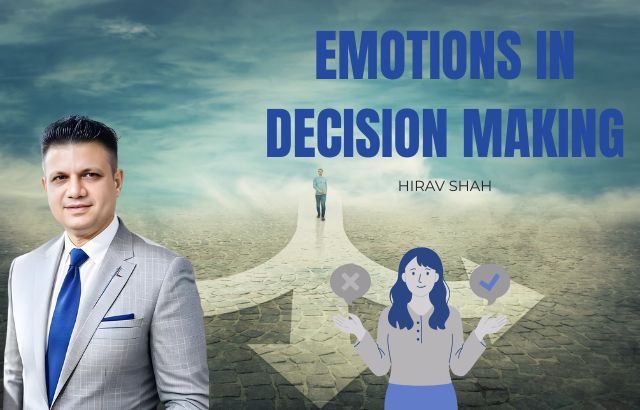Emotional decision making – We’ve all been there. Moments when our emotions take over, leading us to make decisions we regret later. Whether it’s splurging on a luxury item in the heat of excitement or making an impulsive business move during a rush of frustration, we’ve all experienced the consequences of letting emotions drive our choices. But here’s the thing—most of these decisions were made without deep reflection or sound logic. We acted on raw feelings rather than deliberate reasoning.
You may have asked yourself, “What was I thinking when I made that decision?”
Well, the truth is, you probably weren’t thinking at all. Instead, you were responding to emotion. The human mind, complex and nuanced, often makes decisions based on feelings rather than objective reasoning. American Nobel Laureate Herbert Simon put it best:
“In order to have anything like a complete theory of human rationality, we have to understand what role emotion plays in it.”
The reality is that many decisions we face daily are influenced, or even entirely determined, by emotions. Our emotional state skews our judgment, whether we’re in love, angry, excited, or overwhelmed. The key, however, lies in understanding and managing these emotions, especially when it comes to important life and business choices.
Table of Contents
Emotional Decision Making: Why Emotions Cloud Judgment
1. Excitement:
The feeling of excitement is one of the most common emotions that clouds judgment. It’s that rush you get when you spot a shiny new opportunity—a dazzling product or a big investment opportunity—and the excitement makes you act quickly without considering the risks. Think of a gambler at a casino, surrounded by flashing lights, loud sounds, and other patrons winning big. The atmosphere is designed to elevate excitement and make you take higher risks, often leading to financial losses.
Example:
Imagine you’ve just met someone new at a business networking event. You’re immediately attracted to them, and they treat you warmly, making you feel special. Because of the emotional high you’re experiencing, you may ignore red flags in their behavior, only to regret it later when you realize they were manipulative or dishonest.
2. Anger or Frustration:
Emotions like anger or frustration often lead to decisions driven by impulse rather than rationality. A person may decide to make a sudden career move, fire an employee, or cancel a partnership deal after an emotionally charged argument. The problem is that these decisions are made without considering long-term consequences.
Example:
A CEO receives a harsh critique about a company strategy. In frustration, they fire a key team member who they believe is underperforming, without fully understanding the complexities of the situation. This emotional decision later results in a loss of critical expertise, hurting the company.
3. Fear and Anxiety:
Fear of missing out (FOMO) or financial anxiety can cause people to rush into decisions with incomplete information. For instance, the decision to take out a large loan or invest in a high-risk venture without considering alternatives might be influenced by a fear of stagnation or the pressure to keep up with peers.
Example:
A small business owner sees their competitors expanding into new markets, and they feel an intense pressure to do the same. Their anxiety about falling behind leads them to take out a large business loan. However, they fail to research the new market thoroughly, resulting in financial strain and a failed expansion.
A Strategist’s Approach to Emotional Decision Making
As a Business Transformation Leader, my role isn’t just about creating strategies for growth—it’s also about helping leaders and entrepreneurs make better decisions. Making thoughtful, well-reasoned decisions is crucial in any business environment. The emotional rollercoaster that comes with business decisions can cloud judgment, which is why a strategist must act with clarity, patience, and logic.
Here’s how you can bring emotion under control in decision-making:
Hirav Shah’s Mantra:
“Never ever make a permanent decision over an emotion that may be temporary. Emotions come and go, but decisions last.”
Steps to Making Better Decisions in High-Emotion Situations:
- Step Back and Reflect
Take a moment to breathe. Don’t act immediately when you’re feeling emotional. This “pause” allows your brain to shift from emotional processing to rational thinking. - Assess the Situation Objectively
Ask yourself: What are the risks? What are the potential long-term effects? Is this decision aligned with my goals? - Consult Your Team or Mentors
If the decision affects your business or personal life significantly, seek input from others. A strategist never works in isolation—they gather diverse perspectives before making big decisions. - Practice Patience
Allow time for the emotional charge to fade. As emotions settle, clarity often follows.
Example:
Take a recent business decision where an entrepreneur, excited by an offer to sell their company, decided to accept without giving it much thought. Had they waited just a few days and analyzed the terms, they might have realized the offer was undervalued. They would have been able to negotiate better terms or even reject the sale in favor of more strategic growth.
FAQs:Emotional decision making
1. Can emotions ever help in making decisions?
Yes, emotions can provide valuable insights. For instance, intuition or a “gut feeling” often comes from experience and subconscious reasoning. The key is not to let intense emotions cloud judgment but to recognize when they can guide you toward the right decision.
2. How do I differentiate between rational and emotional decisions?
If your decision-making is based on urgency, panic, or excitement, it’s likely driven by emotion. Rational decisions are grounded in a methodical analysis of the pros and cons, with clear reasoning behind the choice.
3. What happens if I make an emotional decision and it turns out to be wrong?
Making emotional decisions can lead to regrets, but it’s not the end of the world. You can always adjust your course. The key is to learn from the experience, reflect on what went wrong, and apply that learning to future decisions.
4. What if my emotions are consistently influencing my decisions?
If you notice a pattern of emotional decision-making, consider working with a mentor, coach, or strategist to help you process emotions constructively. Practice mindfulness and emotional regulation techniques, which can help you improve your decision-making over time.
Final Thoughts
As Business Strategist Hirav Shah often says:
“The quality of your life is determined by the quality of your decisions.”
In business and life, never rush into permanent decisions based on temporary emotions. Learn to step back, reflect, and give yourself the time needed to make sound, logical choices. In this way, you will not only avoid costly mistakes but will also pave the way for better, more calculated decisions that serve your long-term success.
By making emotional regulation a priority and embracing a thoughtful decision-making process, you’re setting yourself up for success in both business and life. So, next time you’re faced with an emotionally charged decision, remember: Step back, reflect, and then decide.
The Role of Emotions in Decision Making: A Business Strategist’s Perspective
By Business Transformation Expert, Hirav Shah















